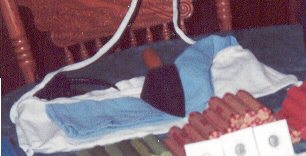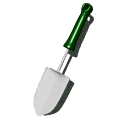|
First, decide on your price range. How much money and time are you going to spend on this hobby. I try to put in four to six
hours on a clear and sunny Saturday. Eight, if I've finished my "Honey, please do this" list.
Second,
decide on the type of hunting you what to do. You might like to hunt on the beach. You may prefer to hunt for old coins and
jewlery. You might want to relic hunt in general, or you may want to hunt for American Revolution artifacts or Civil War relics.
You may want to prospect for gold nuggets or meteorites. I like all hunting in general.
Third, there are a
wide variety of detectors for the types of hunting listed above. Shop around, decide what you think is best for you.
Fourth, after you buy a detector, study the instructions to get the most out of your new detector. Practice in your backyard
by putting some coins/jewlery on the ground. Listen to the sound your detector makes as you pass it over the items. Try it
with bottle caps/drink can pull tabs. Don't forget nails/scrap metal pieces. Listen to sounds they make. This gives you an
idea of what sounds good and what doesn't. Once you are in the field, you'll find a lot of trash that you have to hunt through
to find the good stuff.
Fifth, remember to have fun with it. If you get discourged, take a break, because
you may hunt an area several times before you make any discoveries. Then again, your first time out, you may find a coin/jewlery
that will pay for your metal detector. I've heard stories about people buying one, then the first time they use it, they find
a fortune. The next one could be you.
If you have a friend that you think would like metal detecting, do it together. Or if you have children, do it with them.
The same goes for kids, get your parents into the hobby, you will have fun together.
Other tools you will need.

You will need something to dig in the ground with. Most detector suppliers carry a variety of digging instruments that you
can purchase. It all depends on what you are willing to spend. Above is a picture of my tools.
I myself bought
a small metal mason trowel, for $1.49, to dig with. You can find them at any place that sells hardware. A hand held garden
spade will work good also.
Another useful item to have with you, is a carpenter's nail apron. They cost about
$2.00 or less, and are good for carrying your treasure hunt finds in.
Also carry a work cloth or rag with you.
You can buy a pack of them for less than $3.00. They are good for wiping dirt off of your hands and good to use while digging
in some areas. I'll explain this in more detail, in the (Digging Tips) section.
A metal detector, produces sounds
as you detect objects. I recommend using headphones with your detector. A good set will cost you about $7.00. They serve a
good purpose, they overide the internal speaker of the detector. This cuts down on the amount of noise the detector produces.
Let's say you are on a crowded beach or a playground, you will hear what you are detecting, but no one else will. That way
you don't disturb the people with the noise the detector can produce. Headphones also use less battery power than the built
in speaker on the detector. It will help your batteries last longer, giving you more hunting time, and saving on the cost
of batteries. They can get expensive. Make sure to use alkaline, they cost a little more, but give you the best power output
for the longest amount of time.
Research and Getting Permission.
Knowlege can help you find more on a hunt, than just going out and hunting. A town library can provide you with a history
of an area you are interested in hunting. Long time residents of the area can be a wealth of information. My Uncle J.W., "he's
83 years young" as he says it, has shown me old homestead sites he remembered as a child. They are just wooded areas
now. Great places to find relics and old coins/jewlery. Talk to a grandparent, an uncle/aunt, or your own parents. You can
learn a lot of things. I certainly have.
After you do research and find a suitable location to hunt, GET
PERMISSION before you hunt. No one likes a trespasser. If they say NO, they mean NO. There are some metal detectorist out
there that have given us a bad rep, because they don't respect the land owners wishes by trespassing on their property anyway.
If they say YES, get it in writing if possible, this is to show that you have permission to be on the
property. It doesn't hurt to give the land owner a PERSONAL LIABILY WAIVER signed by you. This just states that if anything
happens to you on their property, that THEY ARE NOT HELD LEGALLY RESPONSIBLE FOR WHAT HAPPENED TO YOU. If you give them this
kind of asurance, most will let you on their property. If you have permission, and a land owner changes his/her mind, respect
their wishes. Leave.
If the land owner asks for compensation for letting you hunt on his/her property,
offer him/her the 50/50 terms. This usually works for me. Tell him/her that you will give them half of what you find. It is
a fair arrangement. Lets say you found an old Mason jar full of coins. There is plenty for you to half with the land owner.
They might not have ever found it, but you wouldn't have either without their permission. Most of the time they don't ask
for compensation. Out of respect though, show them anything you find. If they ask for a fee for hunting, you decide if the
hunt is worth it, and get the transaction in writing also.
When you are allowed to hunt on private property,
respect their property. MAKE SURE TO COVER UP ANY HOLES YOU DIG. Make sure you leave their property the way you found it before
you hunted it. And if you uncover any trash/scrap metal, take it with you and dispose of it properly.
Their
are other metal detecting sites on the net, that you can obtain A CODE OF ETHICS for metal detecting. Listed above are only
my opinions.
Digging Tips.

If you are digging in an area that is well maintained, dig as carefully as possible. A work cloth or rag is good to place
the soil you dig out as you uncover a detected target.
Carefully cut the grass along three sides and fold it back
out of the way. I usually make my flaps about 6" inches in diameter. As you remove soil from the hole, place it on the
cloth you have spread out beside the hole you are digging. This helps cut down on soil smearing, meaning that you don't leave
a lot of soil on top of the grass.
Take your time when you are digging, you can damage a coin/jewlery or relic
if you are not careful. I try to dig to one side of my target, to get under it. Then I can gently pry up and the detected
target will pop up out of the soil.
After removing the object you found, cover up the hole. Pick the cloth up and
pour the loose soil back into the hole. Then just fold the flap of grass back over and gently press it back into place.
If you follow these steps, you can't hardly tell the ground was disturbed.
If you are treasure/relic hunting
in a wooded area, take a shovel with you. Digging through a lot of roots with a small hand tool is difficult. Make sure you
cover up your holes. Even in the middle of nowhere.
|
|

